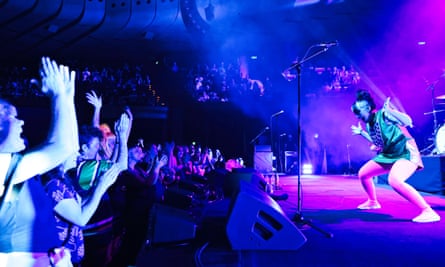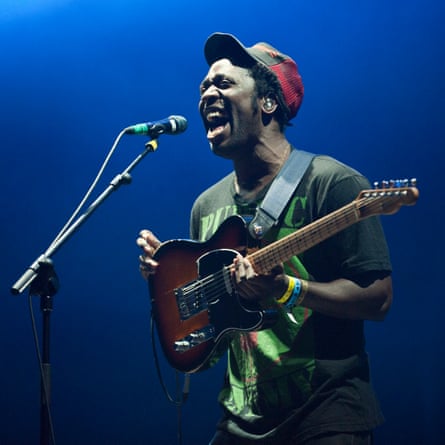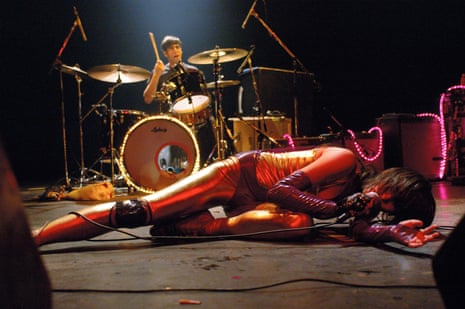I was standing in a field with my friends drinking from a flask as Interpol played, and it wasn’t 2006. A man in front of us in a red Fred Perry zip-up top – I was pretty sure I’d seen it on The OC once – was dancing as if someone had put scalding hot porridge under his bare feet, but that he kind of liked it.
“This was my wedding song!” he shouted to my friend, as Bloc Party started.
“Oh wow!” she said politely.
He pointed enthusiastically across the field: “I actually just bumped into my ex-wife over there.” Their kids were at a relative’s house for the night.
It was at this moment – jamming with this newly divorced dad and sipping a flask that made me feel as tough and sophisticated as a leather jacket – that I had two thoughts: is this band in possession of the world’s last surviving skinny jeans? And should I feel weird that lately I’ve only seen bands I loved when I was 14?
The last concert I’d gone to was Yeah Yeah Yeahs in July, where lead singer Karen O remarked that it had been two decades since their debut album, Fever to Tell. “No way!” I heard myself say, as I unwittingly joined a chorus: an entire stadium of other 32 to 52-year-olds saying “no way!” to each other.
In March, during a blistering set by Bikini Kill on International Women’s Day, Kathleen Hanna exalted the younger feminists who had taught her so much about intersectionality. I swayed to the Strokes the previous winter, even though they were only 60% good. I missed Bright Eyes recently because I didn’t have the cash – but my ears did prick up when I heard Fleet Foxes were supporting the National.

To discover that nostalgia was explicitly driving my gig-going was confusing. Am I in a musical rut? Am I approaching my wine country era, where every gig I want to go to is exclusively held at a regional vineyard at 2pm on a Sunday for $300 a pop, instead of a dirty backroom with a floor of Velcro and walls of dirt? I used to seek out new music like it was a personal mission from God. I hadn’t even noticed that this mission had stopped. When you reach a certain age, does your musical taste stagnate? What did it mean that all my sonic thrills involved me reaching ceaselessly back into the past like those goddamn Gatsby boats?
Likely, it means nothing, because a lot of what we do means nothing. It might just be a normal part of getting older – well, I guess this is growing up (Blink-182 reference intentional). In 2018, the New York Times studied Spotify data to analyse how our musical tastes evolve as we age. They looked at every hit song released between 1960 and 2000 and calculated that the most “important period for forming musical taste” is 14 for men and 13 for women.
If nothing hits you like it hits you when you’re a teenager – and there have been studies showing that music sticks to autobiographical information about our lives and evokes those times – it makes sense that I would want to chase that high. And I found it at those concerts: Bikini Kill was electrifying, I cried when Yeah Yeah Yeahs did Maps and, as the saying goes, hearing a 60% good Reptilia is still better than no Reptilia at all.
There’s science behind it too. When we listen to a song we used to love, the reward centre in our brain is flooded with dopamine, serotonin and every other chemical you might have tried to artificially conjure in a midnight paddock. You chuck on the Hardest Button to Button by the White Stripes and your brain is like “let’s go, boys!”, rushing forward with ping pongs of pleasure and memories of eating hot chippies in the back of the school bus while listening to your Discman. “Musical nostalgia, in other words, isn’t just a cultural phenomenon,” says Slate’s Mark Joseph Stern. “It’s a neuronic command.”

But what does that mean for finding new music? When I was younger, I dedicated time and effort to discovering bands – and when I found one, the thrill was intoxicating. Who knew where my next favourite song might come from? A rogue SoundCloud link, a muddy MP3? It was like falling in love. Studies have found that when you reach your thirties, though, your musical curiosity kind of evaporates. A survey by the music streaming platform Deezer (no idea) found that your music discovery peaks at 24 and by 30 you simply stop looking for new tunes. Of around 1,000 music listeners, 47% said they wanted to find new bands, but thanks to jobs and kids they didn’t have the time. I get it – I too have less time these days – but I also have greater resources: vast rivers of algorithms providing endless new music, just waiting to be discovered. The music is out there! Why aren’t I looking for it?
If I’m disturbed by all of this (I’m fine!), there might be a little bit of internalised ageism at play. I don’t want to eventually become a Keith Richards figure and decide that music I don’t understand is just “people yelling”; the sort of person who writes a piece in the Guardian about being in a musical rut, which younger colleagues roll their eyes at (oh no). Musical taste is so intertwined with the formation of our identities that it’s an easy thing to catastrophise. Besides, my nostalgia trip may just be a case of access: the return of the indie sleaze aesthetic has made the popular bands of the early to mid-2000s big business again. And even if it hadn’t, heritage acts have always funded the musical economy. Heritage to me is Elton John, but I guess it’s Bloc Party too.
At least when I do actually put effort in, I can still find stuff I love. It might not produce the high it did when I was 14, but the thrill of connecting with something completely new – while listening to NTS or Triple R while I work, or receiving links from friends who, thankfully, still treat musical discovery like a calling – remains immediate. There’s still some life in this leather jacket yet. But if you’re wondering if I want to see the Chemical Brothers and the Presets while enjoying a crisp riesling, the answer is yes. A thousand times yes.
